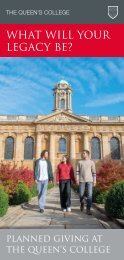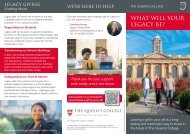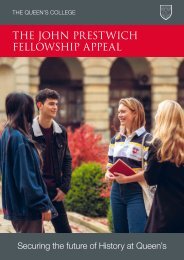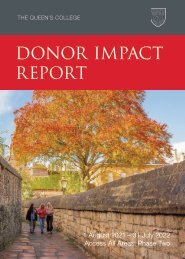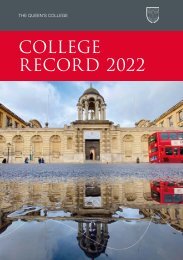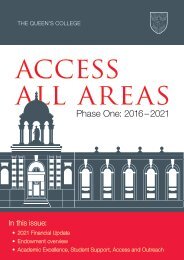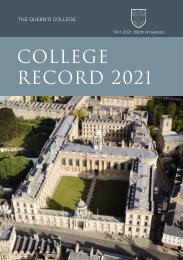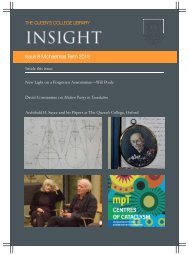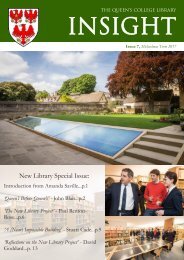The Queen's College Record 2023
Create successful ePaper yourself
Turn your PDF publications into a flip-book with our unique Google optimized e-Paper software.
<strong>The</strong> news of the deaths of Old Members comes to the notice of the <strong>College</strong> through<br />
a variety of channels. <strong>The</strong> <strong>College</strong> is unable to verify all these reports and there may<br />
be some omissions and occasional inaccuracies.<br />
Credit: Veronika Vernier<br />
ALAN PETER BUDD<br />
At one time or another, most of you will have read or sung<br />
the words from Ecclesiasticus, “Let us now praise famous<br />
men, and our fathers that begat us”. Sir Alan Peter Budd<br />
GBE was a famous man. He was a very good economist<br />
and an outstanding public servant. He belonged, as<br />
Ecclesiasticus reminds us, to that group of men “giving<br />
counsel by their understanding, and declaring prophecies.<br />
Leaders of the people by their counsels”. As an economist, Alan declared many<br />
prophecies. And his counsel was always wise, from which I and many others<br />
benefited greatly.<br />
Obituaries<br />
But above all Alan was a great man. He set the standard to which all of us aspired.<br />
His contribution was measured not just by his own achievements, but by the fact that<br />
he made everyone around him better – a better economist, better student, better<br />
teacher, better civil servant, a better person. He was that rare person, someone<br />
you always looked forward to meeting because you knew that you would learn<br />
something, laugh together, share frustrations at the idiocies in the world, and find<br />
answers to your questions, whether about high economic theory, which books to<br />
read or how to grow potatoes. Was there a limit to his wisdom and knowledge?<br />
I never found it.<br />
For three decades, Alan was central to British economic policy. In the 1970s, he<br />
was in and out of the Treasury, and in the 1980s, whether in the Treasury or at the<br />
London Business School, Alan formed a partnership with Terry Burns, now Lord<br />
Burns, which helped to transform Britain’s economic fortunes. After the inflation<br />
and economic disasters of the 1970s, the decade of the 1980s was the period in<br />
which Britain turned the corner. <strong>The</strong> Burns-Budd combination, together with Nigel<br />
Lawson, produced a revolution in British macroeconomic policy. Fiscal policy was<br />
put on a sustainable path and monetary policy was used to control inflation. Growth<br />
would be promoted by microeconomic reforms. No major political party today plans<br />
to reverse that revolution.<br />
In 1991, I joined the Bank of England as its Chief Economist, and a few months<br />
later Alan returned to the Treasury as its Chief Economic Advisor and Head of the<br />
Government Economic Service, succeeding Terry Burns who became Permanent<br />
Secretary. I was immensely fortunate to have Alan as my opposite number, and later<br />
colleague, for almost a decade. We worked closely together during an extraordinary<br />
<strong>College</strong> <strong>Record</strong> <strong>2023</strong> | <strong>The</strong> Queen’s <strong>College</strong> 95






